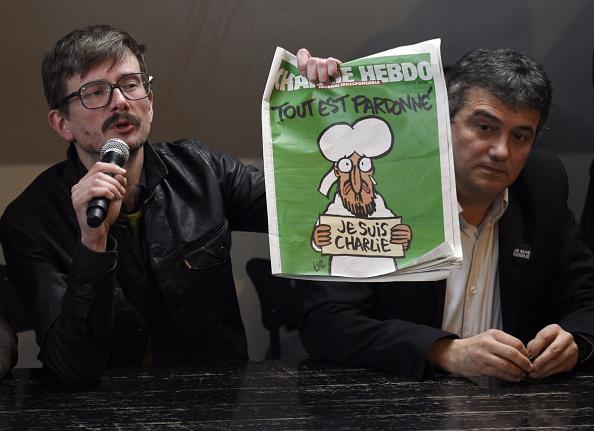The new issue of Charlie Hebdo, released Wednesday, is selling out in France, and as many as 5 million copies may ultimately distributed. Elsewhere in the world, the issue—whose cover image of a cartoon Mohammed is benign, arguably even concilliatory—is being condemned and censored.
In Turkey, where the government of Islamist Turkish leader Recep Tayyip Erdogan is well-known for press suppression:
Turkish police have also raided the presses of a publication printing excerpts of this week’s Hebdo—allowing the excerpts to be distributed only after checking that they did not include any of Hebdo’s images of Mohammed.
The magazine cover “provokes the emotions of Muslims and hurts their feelings around the world, and could fan the flame of a vicious circle of extremism,” said foreign ministry spokeswoman Marzieh Afkham. … [S]he indicated that the new cartoon is “abuse of freedom of speech, which is common in the West these days.”
Grand Mufti of Jerusalem Mohammed Hussein condemned as an “insult” a new cartoon depicting the Prophet Mohammed published on Wednesday by French satirical magazine Charlie Hebdo.
“This insult has hurt the feelings of nearly two billion Muslims all over the world. The cartoons and other slander damage relations between the followers of the (Abrahamic) faiths,” he said in a statement.
The mufti, who oversees Jerusalem’s Muslim sites including Islam’s third holiest, the Al-Aqsa mosque compound, slammed the “publishing of cartoons ridiculing the Prophet Mohammed, peace be upon him, and the disregard for the feelings of Muslims.”
Other global Muslim leaders have criticised the new cartoon, with the Qatar-based International Union of Muslim Scholars saying “it is neither reasonable, nor logical, nor wise to publish drawings and films … attacking the prophet of Islam.”
A number of the Muslim groups and leaders who have criticized the new issue have also cautioned that the response to it should not be violent. “Just as Charlie Hebdo has the right to publish,” said the executive director of the Council on American-Islamic Relations, as quoted in the Telegraph, “we have the right to peacefully challenge negative portrayals of our religious figures.”
